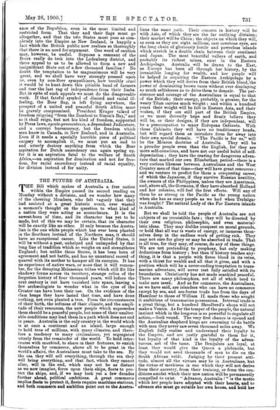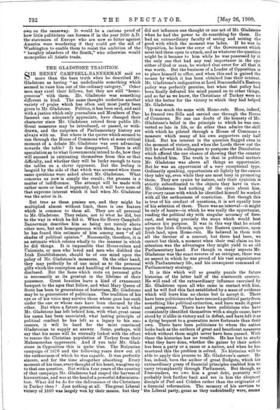THE FU 1 URE OF AUSTRALIA. T HE Bill which makes
of Australia a free nation within the Empire passed its second reading on Monday without a division, and we wonder how many of the cheering Members, who felt vaguely that they had assisted at a great historic event, ever wasted a moment's thought on the question to what kind of a nation they were acting as accoucheurs. It is the newest-born of time, and its character has yet to be made, but of this we may be certain, that its character will be exactly like no other. If only because the Austra- lian is the one white people which has ever been planted in the Southern instead of the Northern seas, it should have an exceptional career. Like the United States, it will be without a east, unhelped and unimpeded by that long line of tradition which so weighs on and strengthens England ; but unlike those States, it has been born of agreement and not battle, and has no unnatural record of quarrel with its mother to hamper all its energies. It has no experience of native wars, or none that it will remem- ber, for the decaying Melanesian tribes which still flit like shadowy forms across its territory, strange relics of the forgotten history of four thousand years, will before the next century is out have vanished into space, leaving a few archeologists to wonder what in the eyes of the Creator can have been their use. On the evidence of the clam heaps they have lasted that time, and have done nothing, not even planted a tree. From the circumstances of their birth, the softness of their climate, and the ampli- tude of their resources, the new people which supersedes them should be a peaceful people, but some of their unalter- able conditions may lead them in a path which does not end in peace. Australia is the only country in the world which is at once a continent and an island, large enough to hold tens of millions, with many climates, and there- fore a tendency to many civilisations yet segregated utterly from the remainder of the world. To hold inter- course with mankind, to share in their fortunes, to enrich themselves by commerce, above all to be great in the world's affairs, the Australians must take to the sea. By the sea they will sell everything, through the sea they will bring everything, and that fact, which they cannot alter, will in the end, which may not be as distant as we now imagine, force upon them ships, fleets to pro- tect the ships, and, if we may look yet a few decades further ahead, political ambitions. A great commerce implies fleets to protect it, fleets require maritime stations, and both commerce and ambition point out to the Austra- liens the same path. Their concern in history will be with Asia, of which they are the far outlying division ; their market will be China; the objects on which they will, as soon as they are eight millions, cast covetous eyes, are the long chain of gloriously fertile and powerless islands which stretch in a double chain between their continent and Japan. The most beautiful valleys of earth, and probably its richest mines, exist in the Eastern Archipelago. Australia will be drawn to the East, as Europe has been all through her history, by the irresistible longing for wealth, and her people will be helped in acquiring the Eastern Archipelago by a power which they will derive from their British blood, the power of dominating brown races without ever displaying so much selfishness as to drive them to despair. The per- sistence and courage of the Australians is equal to that of the British; their energy, probably, is greater, for the weary Titan carries much weight ; and within a hundred years their weight will be felt in Eastern Asia, and their wishes, if they are still part of the British Empire, as we most devoutly hope and firmly believe they will be, or their designs, if they are independent, will be a preoccupation to many European Cabinets. With those Cabinets they will have no traditionary bonds, but will regard them as intruders from far away into their own special domain. "The Pacific is for us," will be the Monroe doctrine of Australia. They will be a prouder people even than the English, for they are more self-conscious' and have not our useful habit of self- depreciation ; they have the craving for dangerous adven- ture that marked our own Elizabethan period—there is a very curious likeness between Australians and the West Country men of that time—they will have great resources ; and we venture to predict for them a conquering career, of which the Japanese, if they survive Russian hostility, the owners of the Philippines, unless they are Americans, and, above all, the Germans, if they have absorbed Holland and her colonies, will feel the first effects. Will any of them be as strong in the Pacific as the young nation when she has as many people as we had when Trafalgar was fought The natural Lady of the Far Eastern islands is Australia.
But we shall be told the people of Australia are not subjects of an irresistible fate ; they will be directed by their own religious, philosophic, and even material- istic ideas. They may dislike conquest on moral grounds, or hold that all war is waste of energy, or immerse them- selves deep in the endless work of getting rich. They may not care for glory or may be absorbed in trade. That is all true, for they may, of course, do any of these things.. We are not pretending to prophesy, but only making deductions from history ; but then if history teaches any- thing, it is that a people with fierce blood in its veins, with a thirst for wealth and all that it gives, and with a position which will be a never-ending temptation to trans- marine adventure, will never rest fully satisfied with its boundaries. Christianity has not made mankind peaceful. There are many philosophies, not all of which tend to make men meek. And as for commerce, the Australians, as we have said, are islanders who can have no commerce except by sea, and sea-borne trade has from the days of Hamilcar to those of William II. made those who sought it ambitious of transmarine possessions. Internal trade is a great thing, but a hundred Shoolbred's shops will not make a Venice. As for the temper of the people, the natural instinct which in the long-run is so powerful to regulate all action,—look round. The very first chance is opened and the Australian shepherd kings are swarming to do battle with men they never saw seven thousand miles away. We English fully realise and understand their loyalty to the Empire, and are justly grateful to them for it, but loyalty of that kind is the loyalty of the adven- turous, not of the tame. The Bengalees are loyal, at least they would give the Queen a plebiscite, but they would not send thousands of men to die on the South African veldt. Judging by their present atti- tude, almost all the virtues may be in Australians, but the virtue of meekness is one which they will not derive from their ancestry, from their training, or from the con- ditions amidst which their new nation will be permanently compelled to exist. "Advance, Australia !" is the motto which her people have adopted with their hearts, and to advance she must go outside her own house, and hold her own on the causeway. It would be a curious proof of bow little politicians can foresee if in the year 2000 A.D. the statesmen of Europe who are now so bitter against America were wondering if they could get the aid of Washington to enable them to resist the ambition of the "haughty islanders of the South," who otherwise would monopolise all Asiatic trade.







































 Previous page
Previous page